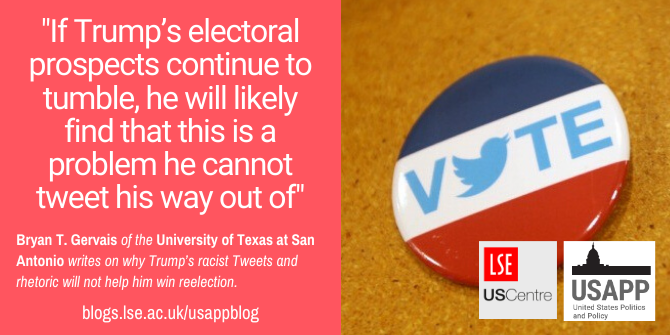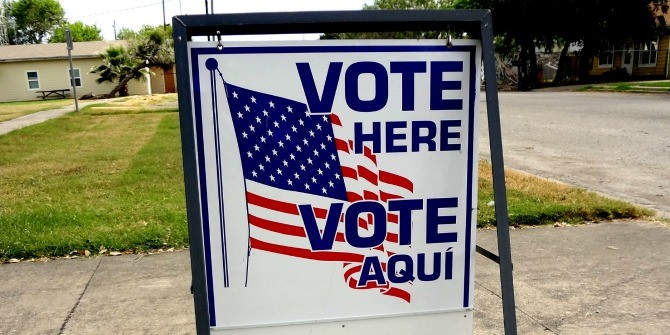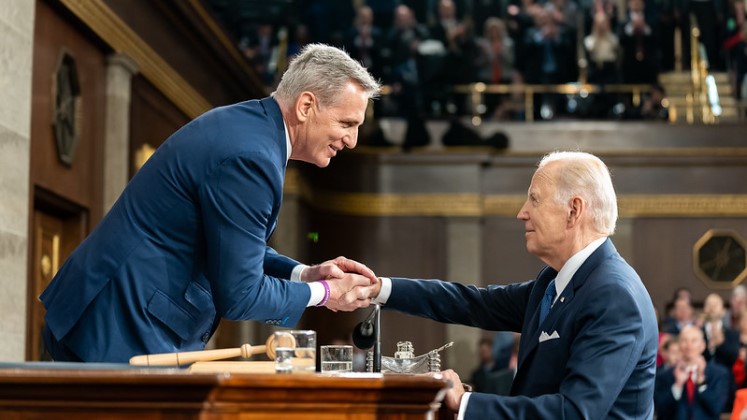 With Trump trailing in the 2020 presidential election polls against his Democratic challenger, former Vice President Joe Biden, the president has returned to his 2016 campaign playbook of using racist and derogatory comments to increase his support. Bryan T. Gervais writes that Trump’s use of incendiary racial rhetoric since his election has turned off many Republican voters, and failed to unite his base behind him or to divide the country in his favor.
With Trump trailing in the 2020 presidential election polls against his Democratic challenger, former Vice President Joe Biden, the president has returned to his 2016 campaign playbook of using racist and derogatory comments to increase his support. Bryan T. Gervais writes that Trump’s use of incendiary racial rhetoric since his election has turned off many Republican voters, and failed to unite his base behind him or to divide the country in his favor.
As it has become more apparent that President Donald Trump faces a tough road to reelection, he has turned to old habits of offering incendiary rhetoric meant divide Americans and inflame racial tensions. Trump’s recent use of the term “Kung Flu” to describe the Coronavirus is only one of the latest examples of his use of racist language to bolster his support. Conventional wisdom holds that his use of uncivil, derogatory rhetoric was key to his winning the presidency, with his 2016 victories cited as evidence that incivility “works”—particularly for Trump and the Republican Party.
Yet there is reason to be skeptical of this claim. Majorities of Democrats and Republicans report being concerned and embarrassed by Trump’s comments. Indeed, survey data has consistently shown that the least popular thing about Trump are his Twitter habits—with most Republicans disapproving, particularly of his personal attacks.
There is also a lack of evidence that incendiary rhetoric succeeds in dividing Americans. The hyper-negative rhetoric of the 2016 presidential election, for example, did not result in Americans holding more prejudicial views towards members of the other party.
It also does not appear to diminish feelings felt towards targeted groups. Political scientist and Democratic pollster Stanley Greenberg found that following Trump’s use of anti-immigration rhetoric ahead of the 2018 midterm elections, approval of immigration increased. Ahead of the November 2018 midterms, 54 percent surveyed agreed that “immigrants today strengthen our country because of their hard work and talents,” and 34 percent agreed that “immigrants today are a burden on our country because they take our jobs, housing and health care.” By July 2019, nearly two-thirds (65 percent) of voters agreed that immigrants strengthened the country, with about a quarter (26 percent) agreeing that immigrants were a burden on the country. And while the partisan gap widened, this is most because the percentage of Democrats who immigrants as a strength has surged. Tellingly, the percentage of Republicans who say the same has stayed rather flat. If anything, the share of Republicans with positive views of immigrants in 2019 was higher than it was at the start of the decade—and this is after Trump’s repeated blistering attacks on immigrants and immigration in 2018. Gallup reported this week that support for immigration among Americans hit an all-time high in June 2020.
Specific instances of Trump’s use of incendiary racial rhetoric have also failed to unite his base behind him. For instance, in July 2019, Trump tweeted out that four Democratic members of Congress who had been critical of his administration’s policies–and who were also women of color–should stop criticizing the United States and “go back and help fix the totally broken and crime infested places from which they came”–despite the fact that three of the four legislators were born in the United States. Polling data revealed only small majorities of Republicans and Trump voters believed it qualified as “acceptable personal attack.” Moreover, the percentage of these individuals who believe Trump respects racial fell from 41 to 37 percent between 2017 and 2019, and he earned his lowest marks for race relations. These numbers have not improved in the aftermath of the George Floyd protests.

‘Twitter vote button’ by Gage Skidmore is licensed under CC-BY-SA-2.0
This polling data dovetails with what scholars leveraging experiments have found: incivility does not aggravate affective polarization. Worse news for Trump, it often backfires for elites. One recent study found that rather than polarizing the electorate, elite incivility can reduce feelings for the partisan in-group and—surprisingly–even improve feelings for the partisan out-group. Another study found that evaluations of Trump are harmed by his use of uncivil rhetoric, and it does not bolster his support even among his diehard supporters.
To be clear, there is plenty of evidence that grievances and racial resentment among Whites motivates support for Trump, and there is also evidence that resentful Whites may be becoming more comfortable with explicit racial derogation than they were two decades ago. Thus, to the extent that Trump can aggravate grievances among Whites, this would be to his advantage. But the empirical record suggests that Trump’s most incendiary rhetoric does not accomplish this. Rather, it is a reflection, not a cause, of cultural resentments. If Trump’s electoral prospects continue to tumble, he will likely find that this is a problem he cannot tweet his way out of, no matter how uncivil and inflammatory the messaging is.
Please read our comments policy before commenting.
Note: This article gives the views of the author, and not the position of USAPP – American Politics and Policy, nor the London School of Economics.
Shortened URL for this post: https://bit.ly/2ZuwB5Q
About the author
 Bryan T. Gervais – University of Texas at San Antonio
Bryan T. Gervais – University of Texas at San Antonio
Bryan T. Gervais is an Associate Professor of Political Science at the University of Texas at San Antonio. He is co-author of the book Reactionary Republicanism: How the Tea Party in the House Paved the Way for Trump’s Victory (Oxford University Press, 2018).






